Opinion | How Vietnam has borrowed from China’s online censorship playbook
- Vietnam is keeping close tabs on public online discourse as it seeks to tap into social media-fuelled nationalism
- But it also tolerated online backlash against Jackie Chan over the South China Sea and anger over Singapore PM Lee Hsien Loong’s Khmer Rouge comments

Only a month earlier, Vietnamese netizens spotted that Abominable , a film co-produced by DreamWorks and the Shanghai-based Pearl Studio, had a map that showed the nine-dash line, and quickly shared screenshots on social media. The film was pulled out of Vietnamese cinemas. This also led to the subsequent demotion of a senior Vietnamese official who was held accountable for allowing the release under her watch.
Granted, governments of all types – freer and those less free – have sought to tap into nationalism to boost their legitimacy. But responsiveness and legitimacy are particularly crucial to the resilience of authoritarian regimes, especially one on the verge of a leadership transition like Vietnam.
In a country where around two thirds of a population of 97 million are online and where Facebook boasts around 47 million active accounts to advertisers, the Vietnamese authorities have become increasingly fixated on gauging public sentiment online.
.JPG?itok=nq_vQfSn&v=1735769975)